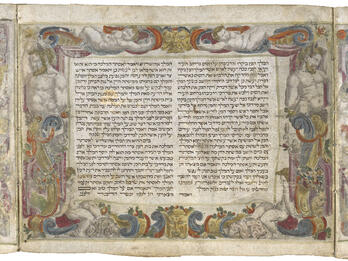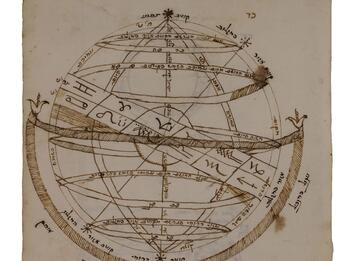Magen va-ḥerev (Shield and Sword)
First Battle2
From ancient times until today, Christians have thought that the difference and divergence between Jews and themselves is that the Jews are awaiting the Messiah that was specified by the prophets and that he will come in the future, whereas they [Christians] say that he has already come. They imagine that if they can force the Jew to admit that the Messiah has already come, he will also admit that the Nazarene was the Messiah, and they will form one association and one faith. This is a huge mistake on their part, as for them, the belief in the coming of the Messiah is the core upon which all of their beliefs depend, and if it should fall, then all of the foundations of their religion will collapse, and their religion will completely tumble. Since they fabricated the idea that due to the sin of the first man all souls were condemned to hell, and God Himself, who was also called Messiah, was required to come in order to redeem them, and He was the Nazarene, as we have written in chapter one. If one removes the necessity of the coming of the Messiah to redeem the souls, then Jesus was nothing, and they have no God and no religion. The Jew, however, who does not have this belief, in accordance with the arguments clarified there, views the coming of the Messiah as an expectation of that which the prophets prophesied, that the Messiah will come to deliver Israel from exile and to gather them together and to return them to their land, and nothing other than this. This is a correct belief for them, in that he who denies it denies a matter of true prophecy, but would not be called a heretic against the Torah and its foundations. These are the words of the rabbi [Isaac Arama], author of the ‘Akedah (15th century), may his memory be for a blessing, in the first two chapters of part one:
Our rabbis of blessed memory said: “The coming of the Messiah is not a principle of the Torah of Moses, as the latter could exist without it.” However, it is a fundamental principle for the religion of the Christians, which has no existence without it. It is a proper belief for every adherent to the Jewish religion, even though it is not a principle of the divine religion.
Accordingly, I am accustomed to say that I believe in the coming of the Messiah because I am a Jew, but I am not a Jew because I believe in the coming of the Messiah. Moreover, even if we admit to them that the Messiah has already come, this does not entail that we will become one with them. For the fact that we do not share one teaching and one law divides us, as well as all of the other disparities between us. And even if the Messiah tarries in coming for tens of thousands of years, the Jew will not move a hairsbreadth from his Torah or from his faith because of this, in accordance with the interpretation of the verse: the secret things that belong to the Lord our God (Deuteronomy 29:28). The is all the more the case in light of the fact that the disputes and arguments concerning the Messiah himself and his circumstances have increased, apart from the basic question of whether or not he has come. First of all, they say that the Messiah was to be God Himself, for nobody apart from Him could redeem the souls from hell, as the pardon of sin comes from God alone; thus, it was necessary for the Redeemer, who is called “the Messiah,” to be God from above. And we, who do not believe in the need for the redemption of the souls, as has been stated, expect a redeemer who will only be a man, like Moses who brought Israel out from Egypt, and Joshua who brought them into the land of Israel, and all of the other judges and saviors of Israel, even though he will be greater than them in certain characteristics. This is to be understood from our rabbis of blessed memory, concerning the verse: Behold, my servant shall prosper, he shall be exalted and extolled, and be very high (Isaiah 52:13): “he shall be exalted above Abraham, and extolled above Moses, and very high above the ministering angels” [Midrash Tanḥuma Toledot 14]. They aim this teaching at us as though it were a sharp arrow, claiming that as it can be assumed that this prophecy refers to the Messiah, a mortal of flesh and blood cannot be higher than the ministering angels; if it is so, then only God can be the Messiah. And after the caveat of which I have already cautioned you, that it is not my intention in this composition to clarify the verses that they bring against us, except for a few notable cases, and all the more so regarding the sayings of our sages of blessed memory, as my answer is the same to all of them, on this occasion I will say that once it is explained that he shall be exalted means above Abraham, and extolled above Moses, it is already evident that this is speaking of a mortal of flesh and blood, for Abraham and Moses cannot be compared to the Lord by saying that the Lord shall be exalted and extolled above them. Rather, the reference here is to the greatness of the wonders of God, which He will carry out through the Messiah, as He will make known through these wonders the existence of the True Creator of the world more so than did Abraham, and he will perform miracles and wonders greater than Moses in the redemption of Israel. And His angels will command him to command them, so that they can perform for Israel like the angel that struck in the Assyrian camp [see Isaiah 37:36] and the like, until he is exalted and extolled and very high in degree and in glory, more so than the angels.
Notes
[Another version reads: “on the Salvation.”—Trans.]
[Another version reads: “Campaign One: that the Messiah will be a human, and the salvation will be corporal.”—Trans.]
Credits
Leone Modena, Magen va-ḥerev: ḥibur neged ha-natsrut (Shield and Sword), ed. Shlomo Simonsohn (Jerusalem: Mekitse nirdamim, 1960), 64–66.
Published in: The Posen Library of Jewish Culture and Civilization, vol. 5.





